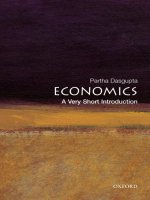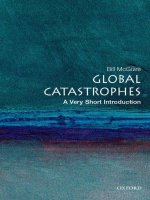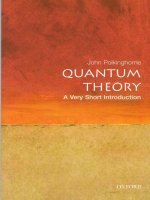The meaning of life: A very short introduction
Bạn đang xem bản rút gọn của tài liệu. Xem và tải ngay bản đầy đủ của tài liệu tại đây (2.01 MB, 129 trang )
The Meaning of Life: A Very Short Introduction
‘warm intellectual pleasure meticulous treatment of the subject. It looks
like Eagleton got it right.’
Mario Pisani, The Financial Times
‘A charming personal voyage round himself, I can only say it left me
thoroughly surprised – and delighted.’
Simon Jenkins, Times Literary Supplement Books of the Year
‘The name Terry Eagleton assures us of stimulation, style, sparkling,
sometimes acerbic, wit, and wide-ranging erudition. In other words he is
eminently readable [a] commendably pocket-sized book.’
Gordon Parsons, Morning Star
‘The book’s a little gem’
Suzanne Harrington, Irish Examiner
‘It is a stimulating and often entertaining … Cook’s tour around the chief
monuments of western philosophy and literature … The Meaning of Life is
unusual and refreshing.’
John Gray, The Independent
‘A lively starting point for late-night debate’
John Cornwell, The Sunday Times
AFRICAN HISTORY
John Parker and Richard Rathbone
AMERICAN POLITICAL PARTIES
AND ELECTIONS L. Sandy Maisel
THE AMERICAN
PRESIDENCY Charles O. Jones
ANARCHISM Colin Ward
ANCIENT EGYPT Ian Shaw
ANCIENT PHILOSOPHY Julia Annas
ANCIENT WARFARE
Harry Sidebottom
ANGLICANISM Mark Chapman
THE ANGLO-SAXON AGE John Blair
ANIMAL RIGHTS
David DeGrazia
ANTISEMITISM Steven Beller
ARCHAEOLOGY Paul Bahn
ARCHITECTURE Andrew Ballantyne
ARISTOTLE Jonathan Barnes
ART HISTORY Dana Arnold
ART THEORY Cynthia Freeland
THE HISTORY OF ASTRONOMY
Michael Hoskin
ATHEISM Julian Baggini
AUGUSTINE Henry Chadwick
BARTHES Jonathan Culler
BESTSELLERS John Sutherland
THE BIBLE John Riches
THE BRAIN Michael O’Shea
BRITISH POLITICS Anthony Wright
BUDDHA Michael Carrithers
BUDDHISM Damien Keown
BUDDHIST ETHICS Damien Keown
CAPITALISM James Fulcher
THE CELTS Barry Cunliffe
CHAOS Leonard Smith
CHOICE THEORY Michael Allingham
CHRISTIAN ART Beth Williamson
CHRISTIANITY Linda Woodhead
CLASSICS
Mary Beard and John Henderson
CLASSICAL MYTHOLOGY
Helen Morales
CLAUSEWITZ Michael Howard
THE COLD WAR Robert McMahon
CONSCIOUSNESS Susan Blackmore
CONTEMPORARY ART
Julian Stallabrass
CONTINENTAL PHILOSOPH
Y
Simon Critchley
COSMOLOGY Peter Coles
THE CRUSADES Christopher Tyerman
CRYPTOGRAPHY
Fred Piper and Sean Murphy
DADA AND SURREALISM
David Hopkins
DARWIN Jonathan Howard
THE DEAD SEA SCROLLS Timothy Lim
DEMOCRACY Bernard Crick
DESCARTES Tom Sorell
DESIGN John Heskett
DINOSAURS David Norman
DOCUMENTARY FILM
Patricia Aufderheide
DREAMING J. Allan Hobson
DRUGS Leslie Iversen
THE EARTH Martin Redfern
ECONOMICS Partha Dasgupta
EGYPTIAN MYTH Geraldine Pinch
VERY SHORT INTRODUCTIONS are for anyone wanting a stimulating
and accessible way in to a new subject. They are written by experts, and have
been published in more than 25 languages worldwide.
The series began in 1995, and now represents a wide variety of topics in
history, philosophy, religion, science, and the humanities. Over the next
few years it will grow to a library of around 200 volumes – a Very Short
Introduction to everything from ancient Egypt and Indian philosophy to
conceptual art and cosmology.
Very Short Introductions available now:
EIGHTEENTH-CENTURY
BRITAIN Paul Langford
THE ELEMENTS Philip Ball
EMOTION Dylan Evans
EMPIRE Stephen Howe
ENGELS Terrell Carver
ETHICS Simon Blackburn
THE EUROPEAN UNION
John Pinder and Simon Usherwood
EVOLUTION
Brian and Deborah Charlesworth
EXISTENTIALISM Thomas Flynn
FASCISM Kevin Passmore
FEMINISM Margaret Walters
THE FIRST WORLD WAR
Michael Howard
FOSSILS Keith Thomson
FOUCAULT Gary Gutting
THE FRENCH REVOLUTION
William Doyle
FREE WILL Thomas Pink
FREUD Anthony Storr
FUNDAMENTALISM Malise Ruthven
GALAXIES John Gribbin
GALILEO Stillman Drake
GAME THEORY Ken Binmore
GANDHI Bhikhu Parekh
GEOPOLITICS Klaus Dodds
GERMAN LITERATURE Nicholas Boyle
GLOBAL CATASTROPHES Bill McGuire
GLOBALIZATION Manfred Steger
GLOBAL WARMING Mark Maslin
THE GREAT DEPRESSION AND
THE NEW DEAL Eric Rauchway
HABERMAS James Gordon Finlayson
HEGEL Peter Singer
HEIDEGGER Michael Inwood
HIEROGLYPHS Penelope Wilson
HINDUISM Kim Knott
HISTORY John H. Arnold
HIV/AIDS Alan Whiteside
HOBBES Richard Tuck
HUMAN EVOLUTION Bernard Wood
HUMAN RIGHTS Andrew Clapham
HUME A. J. Ayer
IDEOLOGY Michael Freeden
INDIAN PHILOSOPHY Sue Hamilton
INTELLIGENCE Ian J. Deary
INTERNATIONAL MIGRATION
Khalid Koser
INTERNATIONAL RELATIONS
Paul Wilkinson
ISLAM Malise Ruthven
JOURNALISM Ian Hargreaves
JUDAISM Norman Solomon
JUNG Anthony Stevens
KABBALAH Joseph Dan
KAFKA
Ritchie Robertson
KANT Roger Scruton
KIERKEGAARD Patrick Gardiner
THE KORAN Michael Cook
LAW Raymond Wacks
LINGUISTICS Peter Matthews
LITERARY THEORY Jonathan Culler
LOCKE John Dunn
LOGIC Graham Priest
MACHIAVELLI Quentin Skinner
THE MARQUIS DE SADE
John Phillips
MARX Peter Singer
MATHEMATICS Timothy Gowers
THE MEANING OF LIFE
Terry Eagleton
MEDICAL ETHICS Tony Hope
MEDIEVAL BRITAIN
John Gillingham and
Ralph A. Griffiths
MODERN ART David Cottington
MODERN CHINA Rana Mitter
MODERN IRELAND Senia Pašeta
MOLECULES Philip Ball
MORMONISM
Richard Lyman Bushman
MUSIC Nicholas Cook
MYTH Robert A. Segal
NATIONALISM Steven Grosby
THE NEW TESTAMENT AS
LITERATURE Kyle Keefer
NEWTON Robert Iliffe
NIETZSCHE Michael Tanner
NINETEENTH-CENTURY BRITAIN
Christopher Harvie and
H. C. G. Matthew
NORTHERN IRELAND
Marc Mulholland
NUCLEAR WEAPONS
Joseph M. Siracusa
THE OLD TESTAMENT
Michael D. Coogan
PARTICLE PHYSICS Frank Close
PAUL E. P. Sanders
PHILOSOPHY Edward Craig
PHILOSOPHY OF LAW
Raymond Wacks
PHILOSOPHY OF SCIENCE
Samir Okasha
PHOTOGRAPHY Steve Edwards
PLATO Julia Annas
POLITICS Kenneth Minogue
POLITICAL PHILOSOPHY David Miller
POSTCOLONIALISM Robert Young
POSTMODERNISM Christopher Butler
POSTSTRUCTURALISM
Catherine Belsey
PREHISTORY Chris Gosden
PRESOCRATIC PHILOSOPHY
Catherine Osborne
PSYCHOLOGY
Gillian Butler and Freda McManus
PSYCHIATRY Tom Burns
THE QUAKERS Pink Dandelion
QUANTUM THEORY
John Polkinghorne
RACISM Ali Rattansi
THE RENAISSANCE Jerry Brotton
RENAISSANCE ART
Geraldine A. Johnson
ROMAN BRITAIN Peter Salway
THE ROMAN EMPIRE
Christopher Kelly
ROUSSEAU Robert Wokler
RUSSELL A. C. Grayling
RUSSIAN LITERATURE Catriona Kelly
THE RUSSIAN REVOLUTION
S. A. Smith
SCHIZOPHRENIA
Chris Frith and Eve Johnstone
SCHOPENHAUER Christopher Janaway
SEXUALITY Véronique Mottier
SHAKESPEARE Germaine Greer
SIKHISM Eleanor Nesbitt
SOCIAL AND CULTURAL
ANTHROPOLOGY
John Monaghan and Peter Just
SOCIALISM Michael Newman
SOCIOLOGY Steve Bruce
SOCRATES C. C. W. Taylor
THE SPANISH CIVIL WAR
Helen Graham
SPINOZA Roger Scruton
STUART BRITAIN John Morrill
TERRORISM Charles Townshend
THEOLOGY David F. Ford
THE HISTORY OF TIME
Leofranc Holford-Strevens
TRAGEDY Adrian Poole
THE TUDORS John Guy
TWENTIETH-CENTURY BRITAIN
Kenneth O. Morgan
THE VIKINGS Julian Richards
WITTGENSTEIN A. C. Grayling
WORLD MUSIC Philip Bohlman
THE WORLD TRADE
ORGANIZATION Amrita Narlikar
1066 George Garnett
EXPRESSIONISM Katerina Reed-Tsocha
GEOGRAPHY John A. Matthews and
David T. Herbert
HISTORY OF LIFE Michael Benton
HISTORY OF MEDICINE
William Bynum
MEMORY Jonathan Foster
NELSON MANDELA
Elleke Boehmer
SCIENCE AND RELIGION
Thomas Dixon
THE UNITED NATIONS
Jussi M. Hanhimäki
THE VIETNAM WAR
Mark Atwood Lawrence
Available soon:
For more information visit our websites
www.oup.com/uk/vsi
www.oup.com/us
Terry Eagleton
The meaning
of life
A Very Short Introduction
1
1
Great Clarendon Street, Oxford OX2 6DP
Oxford University Press is a department of the University of Oxford.
It furthers the University’s objective of excellence in research, scholarship,
and education by publishing worldwide in
Oxford New York
Auckland Cape Town Dar es Salaam Hong Kong Karachi
Kuala Lumpur Madrid Melbourne Mexico City Nairobi
New Delhi Shanghai Taipei Toronto
With offi ces in
Argentina Austria Brazil Chile Czech Republic France Greece
Guatemala Hungary Italy Japan Poland Portugal Singapore
South Korea Switzerland Thailand Turkey Ukraine Vietnam
Oxford is a registered trade mark of Oxford University Press
in the UK and in certain other countries
Published in the United States
by Oxford University Press Inc., New York
Terry Eagleton 2007
The moral rights of the author have been asserted
Database right Oxford University Press (maker)
First published in hardback 2007
First published as a Very Short Introduction 2008
All rights reserved. No part of this publication may be reproduced,
stored in a retrieval system, or transmitted, in any form or by any means,
without the prior permission in writing of Oxford University Press,
or as expressly permitted by law, or under terms agreed with the appropriate
reprographics rights organization. Enquiries concerning reproduction
outside the scope of the above should be sent to the Rights Department,
Oxford University Press, at the address above
You must not circulate this book in any other binding or cover
and you must impose the same condition on any acquirer
British Library Cataloguing in Publication Data
Data available
Library of Congress Cataloging in Publication Data
Eagleton, Terry, 1943–
The meaning of life: a very short introduction / Terry Eagleton.
p. cm.
Includes index.
ISBN-13: 978–0–19–953217–9
1. Life. 2. Meaning (Philosophy) I. Title.
BD431.E14 2008
128–dc22 2007051203
ISBN 978–0–19–953217–9
1 3 5 7 9 10 8 6 4 2
Typeset by SPI Publisher Services, Pondicherry, India
Printed in Great Britain by
Ashford Colour Press Ltd, Gosport, Hampshire
For Oliver, who found the whole idea deeply embarrassing
This page intentionally left blank
Contents
List of illustrations xi
Preface xiii
1
Questions and answers 1
2
The problem of meaning 33
3
The eclipse of meaning 56
4
Is life what you make it? 78
Further reading 102
Index 106
This page intentionally left blank
List of illustrations
1 Wittgenstein 5
© Hulton Archive/Getty Images
2 A ‘New Age’ gathering 23
© Matt Cardy/Alamy
3 Jerry Falwell 25
© Wally McNamee/Corbis
4 A sports fan 27
© Rex Features
5 An Anglican vicar in Monty
Python’s ‘The Meaning of
Life’
31
© Photo12.com/Collection Cinéma
6 Macbeth 39
© Hulton Archive/Getty Images
7 Schopenhauer 49
© Hulton Archive/Getty Images
8 Waiting for Godot 60
© Robbie Jack/Corbis
9 Aristotle 82
© Bettmann/Corbis
10 Monty Python’s Grim
Reaper
90
© Photo12.com/Collection Cinéma
11 Death 92
© Mark Power/Magnum Photos
12 The Buena Vista Social
Club
99
© Road Movie Productions/The
Kobal Collection
The publisher and the author apologize for any errors or omissions in the
above list. If contacted they will be pleased to rectify these at the earliest
opportunity.
This page intentionally left blank
Preface
Anyone rash enough to write a book with a title like this had
better brace themselves for a postbag crammed with letters in
erratic handwriting enclosing complex symbolic diagrams. The
meaning of life is a subject fi t for either the crazed or the comic,
and I hope I have fallen more into the latter camp than the
former. I have tried to treat a high-minded topic as lightly and
lucidly as possible, while at the same time taking it seriously.
But there is something absurdly overreaching about the whole
subject, in contrast to the more miniature scale of academic
scholarship. Years ago, when I was a student in Cambridge, my
eye was caught by the title of a doctoral thesis which read ‘Some
aspects of the vaginal system of the fl ea’. It was not, one would
guess, the most suitable work for those with poor eyesight; but
it revealed an appealing modesty that I have apparently failed
to learn from. I can at least claim to have written one of the very
few meaning-of-life books which does not recount the story of
Bertrand Russell and the taxi driver.
I am very grateful to Joseph Dunne, who read the book in
manuscript and made some invaluable criticisms and suggestions.
TE
This page intentionally left blank
1
Chapters 1
Questions and answers
Philosophers have an infuriating habit of analysing questions
rather than answering them, and this is how I want to begin.
1
Is
‘What is the meaning of life?’ a genuine question, or does it just
look like one? Is there anything that could count as an answer
to it, or is it really a kind of pseudo-question, like the legendary
Oxford examination question which is supposed to have read
simply: ‘Is this a good question?’
‘What is the meaning of life?’ looks at fi rst glance like the same
kind of question as ‘What is the capital of Albania?’, or ‘What is
the colour of ivory?’ But is it really? Could it be more like ‘What is
the taste of geometry?’
There is one fairly standard reason why some thinkers regard
the meaning-of-life question as being itself meaningless. This
is the case that meaning is a matter of language, not objects. It
is a question of the way we talk about things, not a feature of
things themselves, like texture, weight, or colour. A cabbage or
a cardiograph is not meaningful in itself; it becomes so only by
being caught up in our conversations. On this theory, we can make
life meaningful by our talk about it; but it cannot have a meaning
1
Perhaps I should add that I am not myself a philosopher, a fact which I am
sure some of my reviewers will point out in any case.
2
The Meaning of Life
in itself, any more than a cloud can. It would not make sense, for
example, to speak of a cloud as being either true or false. Rather,
truth and falsehood are functions of our human propositions
about clouds. There are problems with this argument, as there are
with most philosophical arguments. We shall be looking at a few
of them later on.
Let us take a brief look at an even more imposing query than
‘What is the meaning of life?’ Perhaps the most fundamental
question it is possible to raise is ‘Why is there anything at all,
rather than nothing?’ Why is there anything about which we
can ask ‘What does it mean?’ in the fi rst place? Philosophers
are divided about whether this is a real question or a bogus
one, though theologians for the most part are not. For most
theologians, the answer to this inquiry is ‘God’. God is said
to be ‘Creator’ of the universe not because he is some kind of
mega-manufacturer, but because he is the reason why there is
something rather than nothing. He is, as they say, the ground of
being. And this would still be true of him even if the universe had
no beginning. He would still be the reason why there is something
rather than nothing even if there has been something from all
eternity.
‘Why is there anything and not just nothing?’ could be roughly
translated as ‘How come the cosmos?’ This could be taken as a
question about causality – in which case, ‘How come?’ would
mean ‘Where does it come from?’ But this is surely not what
the query means. If we tried to answer the question by talking
about how the universe got off the ground in the fi rst place,
then those causes must themselves be part of everything, and
we are back to where we started. Only a cause which was not
part of everything – one which transcended the universe, as God
is supposed to do – could avoid being dragged back into the
argument in this way. So this is not really a question about how
the world came about. Nor, for theologians at least, is it a question
about what the world is for, since in their opinion the world
3
Questions and answers
has no purpose whatsoever. God is not a celestial engineer who
created the world with some strategically calculated goal in mind.
He is an artist who created it simply for his own self-delight, and
for the self-delight of Creation itself. It is understandable, then,
why he is widely considered to have something of a twisted sense
of humour.
‘Why is there anything rather than nothing?’ is rather an
expression of wonderment that there is a world in the fi rst place,
when there could presumably quite easily have been nothing.
Perhaps this is part of what Ludwig Wittgenstein has in mind
when he remarks that ‘Not how the world is, is the mystical, but
that it is’.
2
This, one might claim, is Wittgenstein’s version of what
the German philosopher Martin Heidegger calls the Seinsfrage,
or question of Being. ‘How come Being?’ is the question to which
Heidegger wants to return. He is less interested in how particular
entities came about, than in the mind-bending fact that there
are entities in the fi rst place. And these things are open to our
understanding, as they might easily not have been.
For many philosophers, however, not least Anglo-Saxon ones,
‘How come Being?’ is a supreme example of a pseudo-question. In
their view, it would not only be diffi cult, if not impossible, to know
how to answer it; it is deeply doubtful that there is anything there
to be answered. For them, it is really just a ponderous Teutonic
way of saying ‘Wow!’ It may be a valid question for the poet or
mystic, but not for the philosopher. And in the Anglo-Saxon world
in particular, the barricades between the two camps are vigilantly
manned.
In a work like Philosophical Investigations, Wittgenstein was
alert to the difference between real questions and phoney
ones. A piece of language can have the grammatical form of a
question but not actually be one. Or our grammar can mislead
2
Ludwig Wittgenstein, Tractatus Logico-Philosophicus (London, 1961), 6.44.
4
The Meaning of Life
us into mistaking one kind of proposition for another. ‘What
then, fellow countrymen, once the enemy is vanquished, can we
not accomplish in the hour of victory?’ sounds like a question
anticipating an answer, but is in fact a rhetorical question, to
which one would probably be ill-advised to return the reply:
‘Nothing’. The utterance is cast in interrogative form simply to
enhance its dramatic force. ‘So what?’, ‘Why don’t you get lost?’,
and ‘What are you staring at?’ sound like questions but aren’t
really. ‘Whereabouts in the body is the soul?’ might sound like
a reasonable sort of question to pose, but only because we are
thinking along the lines of a question like ‘Whereabouts in the
body are the kidneys?’ ‘Where is my envy?’ has the form of a
kosher question, but only because we are unconsciously modelling
it on ‘Where is my armpit?’
Wittgenstein came to believe that a great many philosophical
puzzles arise out of people misusing language in this way. Take,
for example, the statement ‘I have a pain’, which is grammatically
akin to ‘I have a hat’. This similarity might mislead us into
thinking that pains, or ‘experiences’ in general, are things we have
in the same way that we have hats. But it would be strange to say
‘Here, take my pain’. And though it would make sense to say ‘Is
this your hat or mine?’, it would sound odd to ask ‘Is this your pain
or mine?’ Perhaps there are several people in a room and a pain
fl oating around in it; and as each person in turn doubles up in
agony, we exclaim: ‘Ah, now he’s having it!’
This sounds merely silly; but in fact it has some fairly momentous
implications. Wittgenstein is able to disentangle the grammar of ‘I
have a hat’ from ‘I have a pain’ not only in a way that throws light
on the use of personal pronouns like ‘I’ and ‘he’, but in ways which
undermine the long-standing assumption that my experiences
are a kind of private property. In fact, they seem even more like
private property than my hat, since I can give away my hat, but
not my pain. Wittgenstein shows us how grammar deceives us
1. Ludwig Wittgenstein, commonly thought to be the greatest
philosopher of the twentieth century
6
The Meaning of Life
into thinking this way, and his case has radical, even politically
radical, consequences.
The task of the philosopher, Wittgenstein thought, was not so
much to resolve these inquiries as to dissolve them – to show
that they spring from confusing one kind of ‘language game’,
as he called it, with another. We are bewitched by the structure
of our language, and the philosopher’s job was to demystify
us, disentangling different uses of words. Language, because
it inevitably has a degree of uniformity about it, tends to make
different kinds of utterance look pretty much the same. So
Wittgenstein toyed with the idea of appending as an epigraph to
his Philosophical Investigations a quotation from King Lear: ‘I’ll
teach you differences’.
This was not a view confi ned to Wittgenstein alone. One of
the greatest of all nineteenth-century philosophers, Friedrich
Nietzsche, anticipated it when he wondered whether it was
because of our grammar that we had failed to get rid of God.
Since our grammar allows us to construct nouns, which represent
distinct entities, then it also makes it seem plausible that there
can be a kind of Noun of nouns, a mega-entity known as God,
without which all the little entities around us might simply
collapse. Nietzsche, however, believed neither in mega-entities nor
in everyday ones. He thought the very idea of there being distinct
objects, such as God or gooseberries, was just a reifying effect
of language. He certainly believed this about the individual self,
which he saw as no more than a convenient fi ction. Perhaps, so
he implies in the above remark, there could be a human grammar
in which this reifying operation was not possible. Perhaps this
will be the language of the future, one spoken by the Übermensch
or Meta-man who has got beyond nouns and discrete entities
altogether, and therefore beyond God and similar metaphysical
illusions. The philosopher Jacques Derrida, a thinker much
indebted to Nietzsche, is rather more pessimistic in this respect.
For him, as for Wittgenstein, such metaphysical illusions are built
7
Questions and answers
into the very structure of our language, and cannot be eradicated.
The philosopher must simply wage a ceaseless, Canute-like war
against them – a battle which Wittgenstein sees as a kind of
linguistic therapy, and which Derrida terms ‘deconstruction’.
3
Just as Nietzsche thought that nouns were reifying, so someone
might think this of the word ‘life’ in the question ‘What is
the meaning of life?’ We shall be looking at this more closely
later. It might also be thought that the question models itself
unconsciously on a different kind of question altogether, and that
this is where it goes wrong. We can say ‘This is worth a dollar, and
so is that, so how much are they worth altogether?’; so it feels as
though we can also say ‘This bit of life has meaning, and so has
that bit, so what meaning do all the various bits add up to?’ But
it does not follow from the fact that the parts have meaning that
the whole has a meaning over and above them, any more than it
follows that a lot of little things add up to one big thing simply
because they are all coloured pink.
All this, to be sure, brings us no nearer to the meaning of life. Yet
questions are worth examining, since the nature of a question
is important in determining what might count as an answer to
it. In fact, it could be claimed that it is questions, not answers,
which are the diffi cult thing. It is well known what kind of answer
a silly question provokes. Posing the right kind of question can
open up a whole new continent of knowledge, bringing other vital
queries tumbling in its wake. Some philosophers, of a so-called
hermeneutical turn of mind, see reality as whatever it is that
returns an answer to a question. And reality, which like a veteran
criminal does not just spontaneously pipe up without fi rst being
interrogated, will only respond to us in accordance with the kinds
of inquiries we put to it. Karl Marx once observed somewhat
cryptically that human beings only pose such problems as they
3
For a more detailed discussion, see my ‘Wittgenstein’s Friends’, in Against the
Grain (London, 1986).
8
The Meaning of Life
can resolve – meaning perhaps that if we have the conceptual
apparatus to pose the question, then we already have in principle
the means to determine an answer to it.
This is partly because questions are not posed in a vacuum. It is
true that they do not have their answers tied conveniently to their
tails; but they intimate the kind of response that would at least
count as an answer. They point us in a limited range of directions,
suggesting where to look for a solution. It would not be hard to
write the history of knowledge in terms of the kind of questions
men and women have thought it possible or necessary to raise.
Not any question is possible at any given time. Rembrandt could
not ask whether photography had rendered realist painting
redundant.
This is not of course to suggest that all questions are answerable.
We tend to assume that where there is a problem there must be
a solution, just as we tend rather oddly to imagine that things
which are in fragments should always be put back together again.
But there are plenty of problems to which we will probably never
discover solutions, along with questions which will go eternally
unanswered. There is no record of how many hairs adorned
Napoleon’s head when he died, and now we shall never know.
Perhaps the human brain is simply not up to resolving certain
questions, such as the origins of intelligence. Perhaps this is
because there is no evolutionary need for us to do so, though there
is no evolutionary need for us to understand Finnegans Wake or
the laws of physics either. There are also questions to which we do
not know the answers because there are in fact no answers, such
as how many children Lady Macbeth had, or whether Sherlock
Holmes had a small mole on his inner thigh. We cannot answer
this last question in the negative any more than we can reply to it
in the affi rmative.
It is possible, then, that there is indeed an answer to the
meaning-of-life question, but that we shall never know what it
9
Questions and answers
is. If this is so, then we are in something like the situation of the
narrator of Henry James’s story ‘The Figure in the Carpet’, who is
told by a celebrated author he admires that there is a concealed
design in his work, one implicit in every image and turn of phrase.
But the author dies before the baffl ed, frantically curious narrator
can discover what it is. Perhaps the author was having him on. Or
maybe he thought there was such a design in his work, but there
wasn’t. Or perhaps the narrator is somehow seeing the design all
along without grasping the fact that he has grasped it. Or maybe
any design he himself manages to construct will do.
It is even conceivable that not knowing the meaning of life is
part of the meaning of life, rather as not counting how many
words I am uttering when I give an after-dinner speech helps me
to give an after-dinner speech. Perhaps life is kept going by our
ignorance of its fundamental meaning, as capitalism is for Karl
Marx. The philosopher Arthur Schopenhauer thought something
of the kind, and so in a sense did Sigmund Freud. For the
Nietzsche of The Birth of Tragedy, the true meaning of life is too
terrible for us to cope with, which is why we need our consoling
illusions if we are to carry on. What we call ‘life’ is just a necessary
fi ction. Without a huge admixture of fantasy, reality would grind
to a halt.
There are moral problems, too, to which no solution can be
had. Because there are different kinds of moral goods, such as
courage, compassion, justice, and so on, and because these values
are sometimes incommensurable with one another, it is possible
for them to enter into tragic confl ict with each other. As the
sociologist Max Weber bleakly remarked: ‘The ultimately possible
attitudes to life are irreconcilable, and hence their struggle can
never be brought to a fi nal conclusion.’
4
Isaiah Berlin writes
in similar vein that ‘the world that we encounter in ordinary
4
Max Weber, Essays in Sociology, ed. H. H. Gerth and C. Wright Mills
(London, 1991), 152.
10
The Meaning of Life
experience is one in which we are faced by choices equally
absolute, the realisation of some of which must inevitably mean
the sacrifi ce of others’.
5
This, one might say, refl ects a certain
tragic vein of liberalism, which, unlike the callow cult of ‘choice’
or ‘options’ of our own day, is prepared to reckon the devastating
cost of its commitment to liberty and diversity. It also contrasts
with a more up-beat brand of liberalism for which plurality
is inherently benefi cial and the confl ict between moral values
invariably energizing. But the truth is that there just are situations
from which one can emerge only with dirty hands. Pressed far
enough, every moral law starts to come apart at the seams. The
novelist Thomas Hardy was well aware that you can paint yourself
unwittingly into moral corners in which, whichever way you
move, someone is bound to get badly damaged. There is simply
no answer to the question of which of your children you should
sacrifi ce if a Nazi soldier orders you to hand over one of them to
be killed.
6
Something of the same goes for political life as well. It is surely
clear that the only ultimate solution to terrorism is political
justice. Terrorism, however atrocious, is not in this sense
irrational: there are situations such as Northern Ireland in
which those who use terror to promote their political ends
come to recognize that their demands for justice and equality
are at last being partly met, conclude that the use of terror has
now become counterproductive, and agree to abandon it. As far
as Islamic fundamentalist terror goes, however, there are those
who claim that even if Arab demands were to be fulfi lled – if
a just solution to the Palestine/Israeli question were to be
implemented, US military bases banished from Arab territory,
and so on – the slaying and maiming of innocent civilians would
carry on.
5
Isaiah Berlin, Four Essays on Liberty (Oxford, 1969), 168.
6
For a useful discussion of moral dilemmas, see Rosalind Hursthouse, On
Virtue Ethics (Oxford, 1999), ch. 3.









